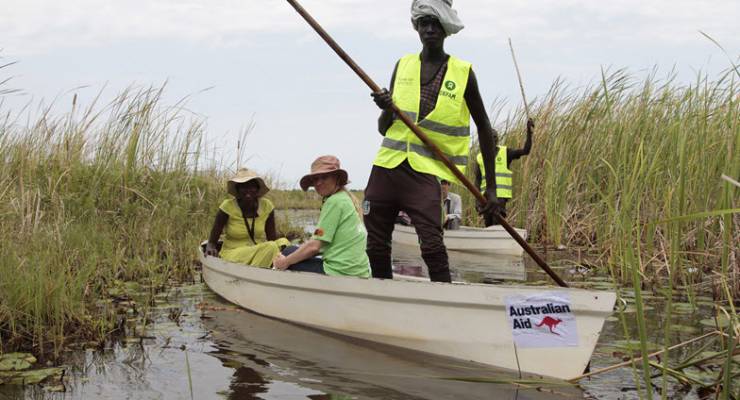
Last night’s federal budget announced further cuts to Australian foreign aid to help fund an expansion of the country’s counter-terrorism activities. There is no doubt that counter-terrorism is both necessary and expensive, but it is a failure of logic — as well as Australia’s commitment to international welfare — to conflate foreign aid with what amounts to intelligence, military, immigration and policing issues.
Australia is already outside the top 15 aid donors, as a proportion of GDP. Of the world’s 28 aid donor countries, Australia’s aid budget has been cut more than any other in recent years, without including the loss of aid funds allocated to pay for its offshore asylum seeker detention program.
Aid is, however, a “soft” target for government cuts or re-allocations, playing to the popular misconception that Australia should spend funds at home before allocating them overseas. There are two problems with this proposition.
The first is that foreign aid is intended not only as a humanitarian gesture but is also to help circumvent potential longer-term problems of poor governance, instability and potential for conflict. The second is that governments that spend less abroad also tend to spend less on domestic welfare, so cutting one does not imply benefiting the other.
It is fair to say that much of Australia’s current aid budget, not including the significant allocation to Manus Island and Nauru, could be better targeted to focus on good governance and education. Countries that come out of poverty tend to do so by having good governance practices, higher education inputs and related, carefully articulated, long-term economic plans.
On the down side, an emphasis on good governance, in particular, can quickly descend into a box-ticking exercise, in which success is measured by somewhat artificial indicators. The “compliance” aspects of box-ticking good governance also reflect a type of bureaucratic authoritarianism that appears to be otherwise increasingly pervasive.
Separately, there is little doubt that terrorism at home and abroad is problem that is both expensive and not going away any time in the foreseeable future. There is, in this, a disproportionate amount of money spent on counter-terrorism in dollar-per-loss-of-life terms; Australia’s road toll remains a much lower funded but far bigger killer.
However, the road toll has become acculturated as a relatively normal risk of everyday life; the threat of terrorism is not. Based on the trajectory of terrorist-type incidents to date, there is a belief in parts of the counter-terrorism community that it is only a matter of time before Australia sees more of the type of terrorism that has recently afflicted Europe.
To that end, some in the counter-terrorism community are toying with currently unpalatable ideas. One question being asked is, at major events, would the Australian public be prepared to see the deployment of soldiers or paramilitary special operations police. Another is whether Australia should be more selective about its present non-discriminatory immigration and refugee intake.
It is doubtful that the Australian public would welcome the presence of soldiers on the streets, not least because they are not trained in policing methods. There are also constitutional issues with the domestic deployment of defence force personnel.
However, many Australians might be more comfortable with a more restrictive immigration policy. Even many of those who disagree with such a policy in principle, would be less roused by a problem that was not immediately visible, as opposed to one that was.
Regardless of whether there are changes to the parameters of Australia’s counter-terrorism profile, it is growing — and will continue to do so. With a cash-strapped government focused on cutting “bad debt”, recurrent expenditure is directly in the firing line and aid is front and centre of recurrent expenditure.
However, as with what should be a greater emphasis of the aid program — good governance, better planning and the education to make them work — Australia, too, could well benefit from focusing on these measures.
The tax cuts introduced under the Howard government as the mining boom rolled in were a short-term political gain that have proven to be unaffordable without a windfall income. That was poor long-term planning.
Shuffling money from one portfolio to another — in this case, from aid to immigration, border security and counter-terrorism by pretending they serve a common purpose — reflects a financial sleight of hand. This constitutes poor governance procedures.
And changes to education funding, especially higher education, shift the financial burden away from the government and towards students, in principle raising the bar to higher education. Perhaps that is just as well, though. A better educated public contributes to a more robust economy and society. But it is also creates a body of people more critically aware of its shortcomings.
*Damien Kingsbury is a professor of International Politics at Deakin University.








“There is no doubt that counter-terrorism is both necessary and expensive”
Oh, word? Stopped reading there.
That fax from Langley VA must be worn out by now – it’s certainly been worked overtime – but I see the scissors & paste is still on the go.
The best counter-terrorism is to stop causing it, at immense cost.